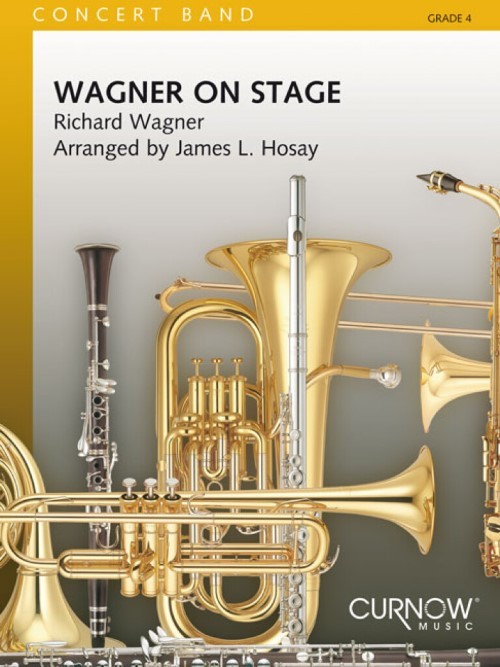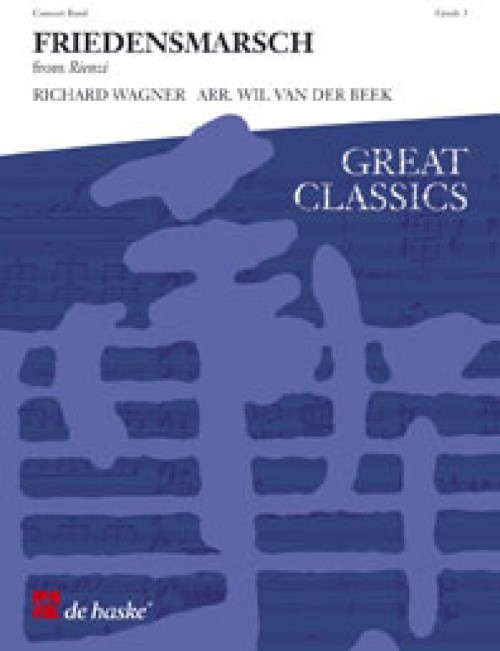Results
-
 £94.99
£94.99Wagner on Stage (Concert Band - Score and Parts) - Wagner, Richard - Hosay, James L.
Wagner on Stage uses extracts from four best-loved of Wagner's operas: Tannhauser, Gotterdammerung, Lohengrin and Die Meistersinger von Nurnberg. Richard Wagner certainly wrote the most dramatic operas of his time. His works are full of passion, dynamic, but also sentimentality. James L. Hosay's arrangement offers therefore a great insight into the creative world of Wagner.Duration: 6.30
Estimated dispatch 7-14 working days
-
 £207.00
£207.00Das Liebesverbot - Richard Wagner
This young, comic opera, composed in 1835 on one of Wagner's own libretti, based on a play by Shakespeare, was unsuccessful at the Magdeburg theatre in 1836 and even the composer considered it a "sin of youth". After attempting in vain to have his first opera, "Le Fate", performed in Germany, Richard Wagner decided that his lack of success was due to the overwhelming competition of Italo-French music. He listened to Bellini, and became aware of the objective reasons for the great success of this music, comparing the warmth of life of Italian music to the frozen and meticulous German style. Hence he composed " Das Liebesverbot " with the sole aim of giving intense pleasure tothe public, without worrying about succumbing to the clichs of French and Italian music. That is why, when we listen to this music without knowing the name of the composer, we find ourselves in an embarrassing situation. We could easily attribute the work to some French composer, Meyerbeer, or Auber, for instance, but then the melodic ease and constructive linearity would bring Rossini to mind. By paying closer attention, however, we notice a boldness, an aggressiveness and a wealth of ideas that, together with clever orchestration, reveal the touch of the great German musician. " Das Liebesverbot " deserves to be performed more often, and we feel sure that the transcription for band will be an excellent vehicle of diffusion for this symphony.
Estimated dispatch 7-14 working days
-
 £121.00
£121.00Prelude to Parsifal - Richard Wagner
Parsifal, written in 1882, was the final opera by composer Richard Wagner (1813-1883). The prelude is a miniature masterpiece consisting of only 116 measures. The form of the prelude is similar to that of the classical three-movement overture and consists of four musical motives: the mystical realm of the Holy Grail; the Grail itself in the Dresden Amen; Faith, represented by the brass chorale; and the Agony of Amfortas. This transcription by John R. Bourgeois faithfully adheres to Wagners intent both in key relationships and orchestration.
Estimated dispatch 7-14 working days
-
 £104.99
£104.99Friedensmarsch - Richard Wagner
Rienzi remains one of the most popular works from the ?master of romantic opera?, Richard Wagner. The Friedensmarsch from the fourth act (scene 2) of Rienzi is subdued and solemn in character: in the sounds of this march, Rienzi strides to a stately church service. This is sure to be a very popular addition to any performance and is one not to be missed.
Estimated dispatch 7-14 working days
-
 £104.99
£104.99Friedensmarsch (Concert Band - Score and Parts) - Wagner, Richard - Van der Beek, Wil
Rienzi remains one of the most popular works from the master of romantic opera, Richard Wagner. The Friedensmarsch from the fourth act (scene 2) of Rienzi is subdued and solemn in character: in the sounds of this march, Rienzi strides to a stately church service. This is sure to be a very popular addition to any performance and is one not to be missed.Duration: 6:15
Estimated dispatch 7-14 working days
-
 £60.00
£60.00Pilgrim's Chorus (from Tannhauser) (Concert Band - Score and Parts) - Wagner, Richard - Bullock, Jack
From the pen of Jack Bullock is this energetic arrangement of the favorite Richard Wagner melody. With characteristic dynamic shadings, this glorious work is sure to please your band and audience alike. Duration: 3.30
Estimated dispatch 7-14 working days
-
£87.99
Siegfried's Funeral Music - Richard Wagner
A classic Wagner selection in a enhanced arrangement. A perfect way to expose your students to the exceptional music of Wagner!
Estimated dispatch 7-14 working days
-
 £78.99
£78.99Pilgrim's Chorus - Richard Wagner
This is the first time the "Pilgrim's Chorus" has been set apart from its use in the overture and is skillfully arranged by Alfred Reed. It's Wagner at his best and of course, Alfred Reed too. OUTSTANDING ARRANGEMENT!
Estimated dispatch 7-14 working days
-
£137.00
Rienzi - Richard Wagner
One of the most recongized overtures of all time in a very exciting and playable arrangement. A perfect way to expose your players to the wonderful world of Wagner.
Estimated dispatch 7-14 working days
-
 £123.20
£123.203 Letzte Motetten - Anton Bruckner
Anton Bruckner (b. 4.9.1824, Ansfelden, d. 11.10.1896, Vienna) didn't have it easy. Throughout his life, the Austrian composer was plagued by self-doubt. Anton Bruckner came from a simple, rural background. After the death of his father, he was accepted as a choirboy at the monastery of Sankt Florian in 1837. After several years as a school assistant and his own organ and piano studies, he first worked as organist in St. Florian, then from 1855 as cathedral organist in Linz. Introduced to music theory and instrumentation by Simon Sechter and Otto Kitzler, he discovered Richard Wagner as an artistic role model, whom he admired throughout his life and also visited several times in Bayreuth.In 1868 Anton Bruckner became professor of basso continuo, counterpoint and organ at the Vienna Conservatory; ten years later court organist; and in 1891 finally honorary doctor of the University of Vienna. He was considered an important organ virtuoso of his era, but had to wait a long time for recognition as a composer. It was not until Symphony No.7 in E major, composed between 1881 and 1883, with the famous Adagio written under the effects of Wagner's death, that he achieved the recognition he had hoped for, even if he was reluctant to accept it given his inclination towards scepticism and self-criticism.Anton Bruckner was a loner who did not want to follow a particular school or doctrine. He composed numerous sacred vocal works, such as his three masses, the Missa Solemnis in B flat minor (1854), the Te Deum (1881-84) and numerous motets. As a symphonic composer, he wrote a total of nine symphonies and many symphonic studies from 1863 onwards, tending to revise completed versions several times over. Bruckner's orchestral works were long considered unplayable, but in fact were merely exceptionally bold for the tonal language of their time, uniting traditions from Beethoven through Wagner to folk music, on the threshold between late Romanticism and Modernism.Anton Bruckner composed about 40 motets during his lifetime, the earliest a setting of Pange lingua around 1835, and the last, Vexilla regis, in 1892.Thomas Doss has compiled some of these motets in this volume for symphonic wind orchestra.These motets show many characteristics of personal expression, especially Bruckner's colourful harmony in the earlier works, which is in places aligned with Franz Schubert (changes between major and minor; and movements in thirds). Later works are characterised by many components which, in addition to the expanded stature of the movements, include above all a sense of the instrumentation as an outward phenomenon and the harmony as a compositional feature that works more internally. Some aspects of Bruckner's work are the result of his long period of study, which familiarised him not only with the tradition of his craft, but also gave him insights into the "modernity" of his time in such composers as Wagner, Liszt and Berlioz.From this developed his personal standpoint, which always pursues the connection between the old and the new.
Estimated dispatch 7-14 working days
